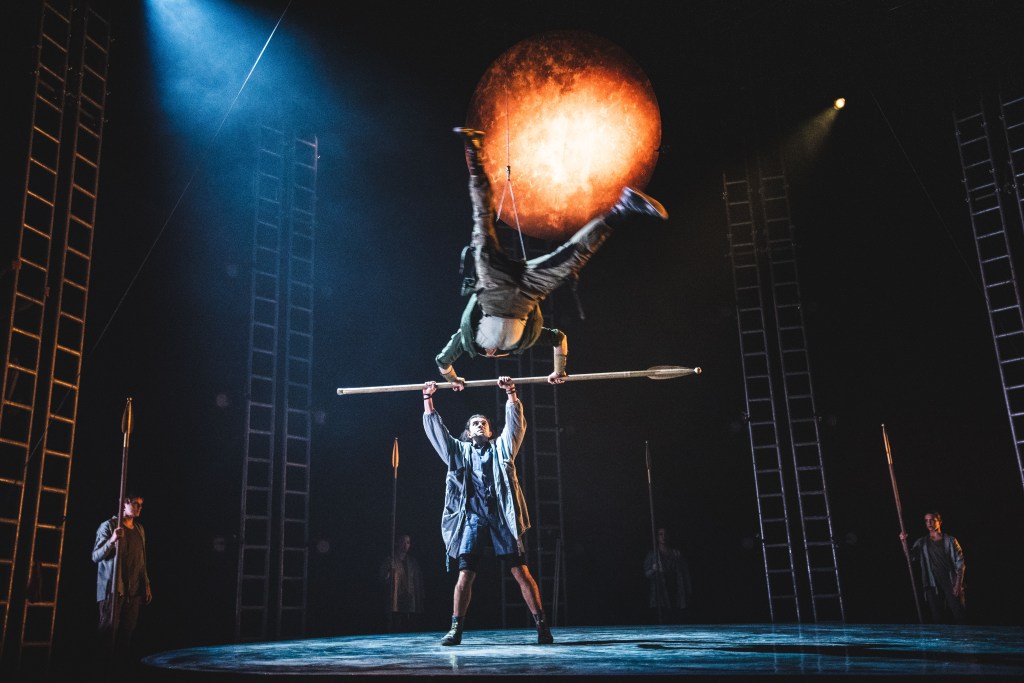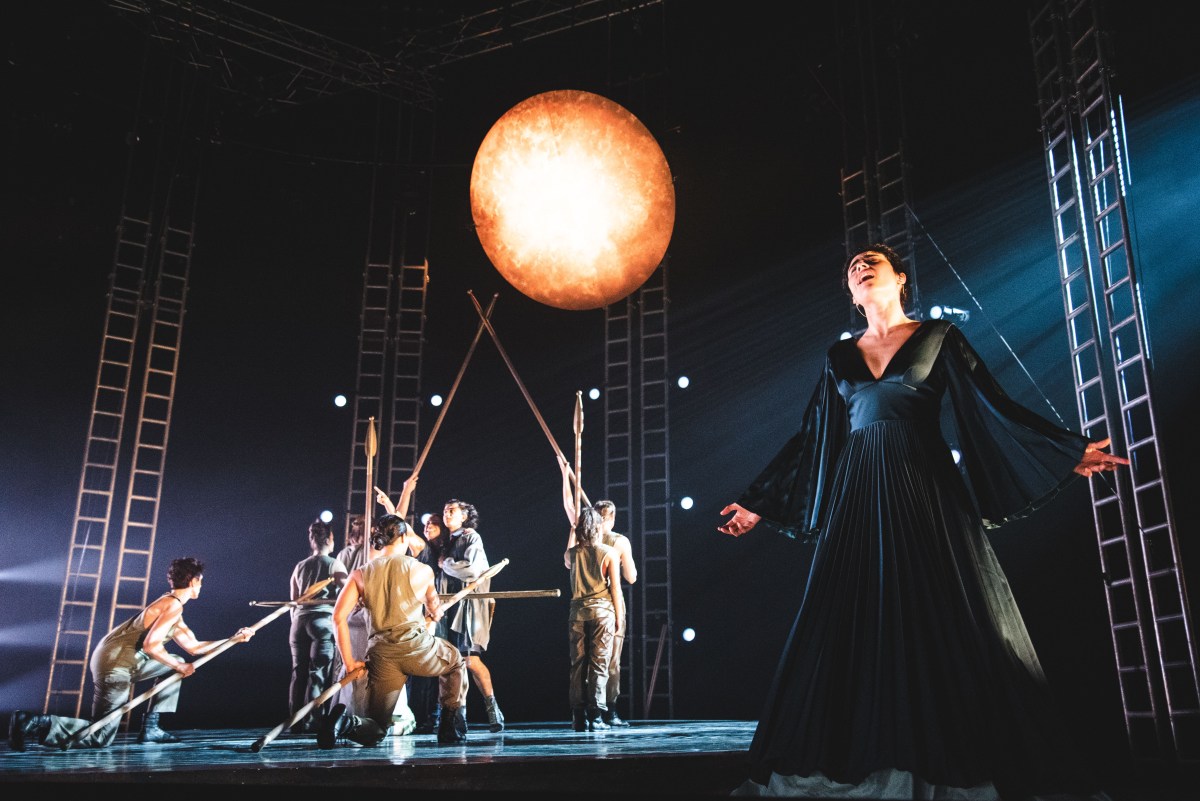In a first-time collaboration between two of Australia’s most innovative performing companies, Dead Puppet Society and Legs on the Wall, Holding Achilles makes its much-anticipated world premiere as part of the Brisbane Festival.
Based on Homer’s great epic work, The Illiad, David Morton and Joshua Thomson have chosen to re-examine the myths surrounding the larger-than-life characters of kings and warriors in an ambitious production that blends narrative, visual spectacle, puppetry and physical theatre.
The central tenet of this production examines the love relationship between Greek warrior, Achilles, and his lesser-known compatriot, Patroclus.
As a teenager, the exiled Patroclus comes to live with Achilles’ father, Peleus. He and Achilles dislike each other at first but over time their relationship mellows. They become friends and then lovers.
The protagonists have several adventures. Patroclus saves Achilles from death, and they both train together as warriors under the Centaur, Chiron. This prepares them for the Trojan War in which they are obliged to fight with King Agamemnon and his brother Menelaus over the stolen Helen of Troy.
Read: Theatre review: Fourteen
The interactions, the politics and the many characters involved in the Trojan Wars were complex, as the huge synopsis in the program proves. As a result, David Morton’s story arc was also at times confusing, as might be expected. For example, it is difficult to understand from the presented narrative how and why Achilles (Stephen Madsen) and Patroclus (Karl Richmond) became lovers with such a depth of feeling.
If it was only a physical attraction, then neither actor appears particularly comfortable in their portrayal and this tends to undermine the premise of the production. Though it was clearly a deliberate choice, it does not help that the two protagonists speak in a casual vernacular, eschewing Homer’s mellifluous language. A more poetic sensibility may have assisted character development.
A number of the warrior and regal characters are portrayed somewhat one-dimensionally, though John Batchelor (Odysseus) and Thomas Larkin (Peleus) give well-rounded, truthful performances.
As Chryses, Jennifer Vuletic is a powerful advocate. Her plea as Priam to Achilles for the return of Hector’s body is sensitively and emotionally played. Christy Tan is a feisty and proud Briseis. Lauren Jackson’s Agamemnon is all bluster and presented at a high-octane level that makes a nonsense of the scheming Greek King.
Directorially, the approach is linear, the story unfolding with minimal dramatic action provided by the choreographed aerial and on-ground fight sequences. However, there are some lovely staged moments involving the killing of a large, well-realised and operated puppetry bear, Heracles. Its frightened, crying cub is carefully managed by Ellen Bailey.
Nic Prior’s centaur, Chiron, on stilt-walking horse heels, gives a marvellously nuanced performance that is a real highlight of the show. This is followed by a beautiful scene set around a fire of red glowing crystals, while the story of Helen’s life is enacted in the background.
The impressive set, co-designed by Anna Cordingley and Morton, is dominated by a huge suspended central disc in gold and silver, representing the sun and moon. It hangs over a largely bare stage which provides a wide palette for Ben Hughes’ lush and atmospheric lighting design. He creates stunning colour-washed stage pictures with the added use of impressive star cloths.
Unfortunately, the sound design by Tony Brumpton is problematic. Most of Montaigne’s songs were excessively reverberated, making it difficult to hear the lyrics. And on opening night, almost every mic cue in Act II was late, so that we lost the first words of the actors in the narrative sections.
Cordingley’s costume designs yield mixed results in terms of appeal and relevance. Some of the king and queen costumes have a medieval, eastern flavour, with layered tabards over wide silken trousers that look good and prove practical during aerial activity. Montaigne’s shimmering deep blue gowns, representing her connection to the sea as a nymph, are stunning. But, as Agamemnon, Lauren Jackson’s black taffeta Victorian dress is anachronistic.
Our two major protagonists are dressed mainly in drab, ill-fitting clothing that does nothing to enhance their regal status. Surely it would be possible to design attractive, stylish clothing that allows for physical movement? There appears to be no rationale for this poor choice.
A rhythmic score composed by Tony Buchen and Chris Bear, with input from vocalist Montaigne, explores well-worn musical paths but with a distinct and impressive voice. The orchestral score is melodic and tuneful. The Act I romantic theme for the two lovers is haunting. There are suitably dark, sombre percussive sounds, alongside threatening drum rolls, for the war scenes and fights.
Montaigne, with her distinctive and emotive voice, introduces delicate high-pitched notes as well as gravelly undertones into her many songs, as the voice of Achilles’ dead mother, Thetis. She floats on and off the stage as a ghostly presence, though exploring her entry from a water-based perspective would have had merit.

The performance is given up mostly to aerial flying and carefully choreographed fight scenes on the ground, all skilfully directed by Thomson. Given that a number of artists were not trained physical performers, they manage their scenes well, though there is a sense of trepidation before they jump on spears or are hauled into the air.
Madsen and Richmond, who perform the bulk of the aerial work, are confident when airborne. There is a beautiful scene in Act II with both protagonists flying, supposedly swimming under the sea, while Thetis sings ravishingly. It is a magical moment. More effects of this nature would add excitement.
The ground fights, using spears, are well-delivered and create some strong stage pictures. However, after many aerial fight scenes and even more on the ground, one tires of constant repetition. For the most part they do little to advance the storyline.
Read: Theatre review: Dorr-e-Dari
Ultimately, it feels as if this production is still in a workshop phase and not yet fully ready for the stage. Some things work well, others not so, with the balance of narrative, physical and visual elements still needing more precise articulation if it is to hold interest.
Some reworking will fix a lot of current problems.
Holding Achilles by David Morton
Dead Puppet Society and Legs on the Wall
Playhouse Theatre, QPAC, Brisbane
Director and Co-Creator: David Morton
Movement Director and Co-Creator: Joshua Thomson
Creative Producer: Nicholas Paine
Composers: Tony Buchen and Chris Bear with Montaigne
Music performed live by Montaigne
Set Co-Designers: Anna Cordingley and David Morton
Costume Designer: Anna Cordingley
Lighting Designer: Ben Hughes
Cast: Stephen Madsen, Karl Richmond, Ellen Bailey, John Batchelor, Lauren Jackson, Thomas Larkin, Nic Prior, Christy Tran, Jennifer Vuletic, Montaigne
Holding Achilles will be performed until 10 September 2022, as part of the Brisbane Festival.





